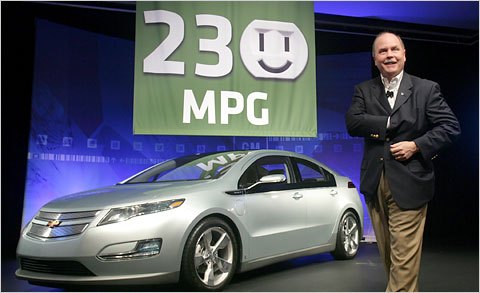#MPG
Are Fat People Driving Up The Price Of Gas? Are They The Source Of The Greenhouse Effect?
Yes, and yes, says a study of the Resources for the Future (RFF) institute. The Washington think tank’s study examined “the unexplored link between the prevalence of overweight and obesity and vehicle demand” for bigger and more gas guzzling cars.
RFF brands itself as a “nonpartisan organization that conducts independent research.” Their study found “that the prevalence of overweight and obesity has a sizable effect on the fuel economy of new vehicles demanded. A 10 percentage point increase in the rate of overweight and obesity among the population reduces the average miles per gallon (MPG) of new vehicles demanded by 2.5 percent, an effect that requires a 30 cent increase in gasoline prices to counteract.” Basically what they are saying: Fat people choose fat cars. More fat people, more fat cars.
Shame on you if your belly keeps you from reading the numbers on the bathroom scale, you are driving up the cost of our gas, fatso. If you would eat less, we would pay less. If the study is correct.
Sticker Wars: Leaf Beats Volt. FTC Trumps EPA
The official MPG(e) ratings for Chevy’s Volt and Nissan’ Leaf have been out for a few days. Finally, The Nikkei [sub] noticed something: Nissan’s “all-electric Leaf has gained bragging rights in the U.S. market after garnering a higher fuel economy rating than the Chevrolet Volt.” Bragging rights bestowed courtesy of the U.S. government.
Motor Trend Reveals The "Secret" To Getting 127 MPG In A Chevy Volt
The Chevy Volt: As Efficient As You Want It To Be
If the recent flap over the Volt’s drivetrain has taught us anything it’s that A) GM’s internal-combustion-assisted plug-in is more complicated than we thought, and B) GM is fine with simplifying its complex reality in order to make it appear as attractive as possible. Which is just fine: they’re the ones trying to sell a $41k car, and as such they’re entitled to do what they can to make it seem worth its many shortcomings. What the automotive media needs to take away from the brou-ha-ha isn’t necessarily that GM’s hesitance to bring forward “the whole truth” is an intrinsically big deal (let’s just say this wasn’t the first time), but rather that knowledgeable writers should focus on explaining the Volt in ways that are both comprehensible and fully accurate. In this spirit, the most important question isn’t “what should we call the Volt?” but “how efficient is the Volt in the real world?”And on this point, there’s plenty of room for some truthful clarification.
Fuel Efficiency Still A Consumer Concern
According to a study by the Consumer Federation of America (PDF), relatively low gas prices haven’t done much to change consumer trends towards more fuel-efficient vehicles. This revelation comes amid claims that small car demand was artificially inflated by high gas prices and increased truck production from General Motors. The survey asked respondents to rate the importance of gas prices, global warming and US dependence on Middle East oil over the next five years, with 76 percent reporting “great concern” for gas prices and energy independence.




















Recent Comments